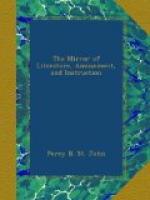king’s court, who sounded the watch every night;
and in towns paraded the streets during winter, to
prevent theft, &c. At Exeter they were set up,
with a regular salary, in 1400; and although suppressed
by the Puritans, were reinstated in 1660. M.A.
Boyer, in his
French and English Dictionary,
Rivington. 1747, under the word
waits, s. has
the following: “in the French,
sorte
de hautbois, (ho-boy,) corresponding with the
signification of the term waits, as itinerant or wandering
(music or) musicians. These nocturnal perambulators,
it seems, were anciently called, as they now are,
waits; and persons, bearing the same name, still go
about our streets during the month of December, (previous
to the 25th.) Whatsoever may be the reasons or the
motives of those (maunderers) who
now call
themselves waits, I must leave for the consideration
of such as are favoured with their visits. I
am of opinion it can have neither allusion nor similitude
to the Christmas carol as some have suggested, which
was an imitation, however humble, of ‘The glory
to God on high,’ &c., as sung by the angels who
hovered over the fields of Bethlehem on the morning
of our Saviour’s nativity.” It is
true, indeed, that our modern angels,
the waits
of 1897, have
hovered about, and
they may
(without a pun) be styled angels (of darkness), not
only on account of the watch they keep
a nights,
but on account of those
spirit-uous propensities,
for the attainment of which, principally, some have
supposed,
we are
indebted to
them
for
their waits, and also for their
wait-ing
upon us on the day ycleped boxing-day.
But to return to our subject; independent of the origin
of the waits, or of the persons so called, as relates
to the institution in England, which is, comparatively,
of modern date, it appears there were peculiar
to the Romans a description of individuals, who,
in their offices and character, answered to our waits,
and from whom there is no doubt the latter were derived;
these, among the Romans, were called spondaulae,
from which I conceive the waightes, or waites,
of our ancient kings were borrowed. The Roman
waites, or spondaulae, were a description
of vocal and instrumental musicians, who performed
a hymn, whose measure consisted of spondees, (a poetic
foot, formed of two long syllables,) which was sung,
accompanied by the flute, or other wind instrument,
while the priest offered the sacrifice, and the incense
was burning, to procure the favour of the gods; the
waits, or spondaulae, continuing their music, to prevent
the priest from hearing sounds of ill omen, which
might disturb the ceremony, or divert his attention.
It has been suggested, in this view of the origin
of the waits, which many writers consider to be the
real source of the custom, that they are altogether
anti-christian, and of heathen and idolatrous foundation,
and of consequence have neither allusion to, nor connexion
with, our festivities at Christmas at any period.




